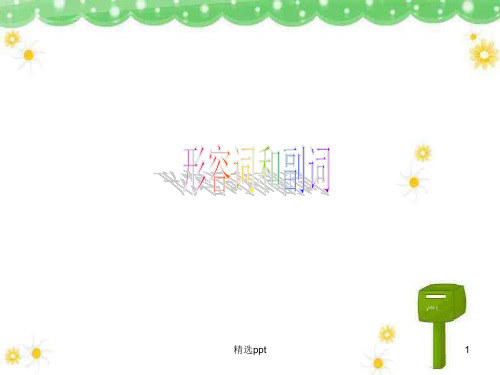形容词副词(讲解)PPT精选文档
合集下载
形容词和副词公开课PPT课件

比较级和最高级错误
与形容词类似,副词也有比较级和最高级形式,需注意正 确使用。例如,“更快”而非“快er”,“最慢”而非 “慢est”。
避免常见误区和注意事项
避免过度使用形容词和副词
过多的形容词和副词会使句子显得累赘,影响表达效果。应力求 简洁明了,仅在必要时使用。
注意语境和表达习惯
形容词和副词的使用需根据具体语境和表达习惯进行调整,避免生 搬硬套。
04
形容词和副词在句子中运用
形容词在句子中位置和作用
01 形容词定义
描述名词或代词性质、状态或特征的词。
02 形容词在句子中的位置
通常位于名词前,如“美丽的花园”中的“美丽 ”。
03 形容词的作用
使句子更加生动形象,帮助读者或听者更好地理 解和想象所描述的事物。
副词在句子中位置和作用
副词定义
修饰动词、形容词、其他 副词或整个句子的词。
形容词分类及举例
品质形容词
描述人或事物的品质或特 征,如“美丽的”、“善 良的”。
数量形容词
描述人或事物的数量或程 度,如“许多”、“一些 ”。
指示形容词
用来指示特定的人或事物 ,如“这个”、“那个” 。
疑问形容词
用来引导疑问句,询问人 或事物的性质、特征或状 态,如“什么样的”、“ 怎样的”。
常见易混淆形容词辨析
• 比较级
单音节词和部分双音节词 通过加-er和-est构成比较 级和最高级;多音节词和 部分双音节词通过加more 和most构成比较级和最高 级。
John is taller than Tom. (约翰比汤姆高。)
05 • 最高级
Of all the students in the class, Mary studies the hardest.(在班上所有学生 中,玛丽学习最努力。)
与形容词类似,副词也有比较级和最高级形式,需注意正 确使用。例如,“更快”而非“快er”,“最慢”而非 “慢est”。
避免常见误区和注意事项
避免过度使用形容词和副词
过多的形容词和副词会使句子显得累赘,影响表达效果。应力求 简洁明了,仅在必要时使用。
注意语境和表达习惯
形容词和副词的使用需根据具体语境和表达习惯进行调整,避免生 搬硬套。
04
形容词和副词在句子中运用
形容词在句子中位置和作用
01 形容词定义
描述名词或代词性质、状态或特征的词。
02 形容词在句子中的位置
通常位于名词前,如“美丽的花园”中的“美丽 ”。
03 形容词的作用
使句子更加生动形象,帮助读者或听者更好地理 解和想象所描述的事物。
副词在句子中位置和作用
副词定义
修饰动词、形容词、其他 副词或整个句子的词。
形容词分类及举例
品质形容词
描述人或事物的品质或特 征,如“美丽的”、“善 良的”。
数量形容词
描述人或事物的数量或程 度,如“许多”、“一些 ”。
指示形容词
用来指示特定的人或事物 ,如“这个”、“那个” 。
疑问形容词
用来引导疑问句,询问人 或事物的性质、特征或状 态,如“什么样的”、“ 怎样的”。
常见易混淆形容词辨析
• 比较级
单音节词和部分双音节词 通过加-er和-est构成比较 级和最高级;多音节词和 部分双音节词通过加more 和most构成比较级和最高 级。
John is taller than Tom. (约翰比汤姆高。)
05 • 最高级
Of all the students in the class, Mary studies the hardest.(在班上所有学生 中,玛丽学习最努力。)
如何区分形容词(的)和副词(地

6. A. good B. badly C. bad
7. 4. He writes very _B___.
8. A. careful B. carefully C. bad
9. 5. I study very_A___.
10. A. hard B. hardly C. careful
11.6. The weather geAts ___
二、构成的规则变化有5个:
1、一般在单音节词尾加 — er 或 — est
原级 比较级 最高级
cold
Hale Waihona Puke colder coldest
high
higher highest
tall
taller tallest
quiet
quieter quietest
2、以e结尾的单词只在词尾加-r或-st 原级 比较级 最高级
形容词 、副词
精选版课件ppt
1
1, ①如何区分形容词(的)和副词(地 -ly) happy-happily real-really true-truly
usual-usually bad-badly loud-loudly
lucky-luckily kind-kindly quick-quickly
3.It tastes _C__ . A. badly B. well C. bad 4. Do you feel __B_ now ? Thanks , I’m Ok.
A. good B. well C. badly
5. The boy is getting精_选A_版课_件ppt
6
A. strong B. strongly C. heavily
形容词和副词(共19张PPT)

04
形容词和副词的特殊用法
形容词的特殊用法
形容词作名词
形容词的比较级和最高级
某些形容词可以作为名词使用,如“ 幸福”、“成功”等,表示一种状态 或结果。
形容词有比较级和最高级的用法,用 于描述程度或数量的差异,如“更快 ”、“最高”等。
形容词修饰名词
形容词可以放在名词前面,用来描述 名词的特征或属性,如“美丽的花朵 ”、“高大的建筑”等。
详细描述
副词用于描述动词、形容词或其他副词的行为方式、程度、时间、频率等,对于准确表达动作或状态的细节至关 重要。通过副词选择题,可以练习副词在不同语境中的用法,如描述动作发生的时间、方式、频率等,判断副词 的正确用法和意义。
综合练习
总结词
提高综合运用形容词和副词的能力
详细描述
综合练习是将形容词和副词结合在一起使用的练习方式,通过设置语境和情境,让学生根据上下文选 择合适的形容词和副词,以增强学生对形容词和副词的理解和应用能力。综合练习可以包括填空、改 错、翻译等形式,让学生在实际运用中提高对形容词和副词的掌握程度。
副词的比较级和最高级
副词的比较级
用于描述动作、状态或方式在两个或更多的人或事物之间的 相对差异。通常在副词后加“-er”或“more + 副词原形” 构成比较级。例如,“faster”和“more beautifully”。
副词的最高级
用于描述动作、状态或方式在三个或更多的人或事物中的最 高或最低程度。通常在副词后加“-est”或“most + 副词原 形”构成最高级。例如,“fastest”和“most beautifully”。
THANK YOU
ห้องสมุดไป่ตู้感谢各位观看
表示动作的程度,如“very”、 “too”、“quite”、“almost”等 。
形容词和副词PPT课件

A house smells as if it hasn’t
lived in for years.
A. little white wooden B. little wooden white
C. white wooden little D. wooden white little
4) A Students are required to take part in
4. The apple tastes __C___ and sells ___ .
A. well; well
B. good; good
C. good; well
D. well; good
5. Your answer sounds __A___ .
A. correct C. correctness
certain表示“某”时,只能用作定语:a certain
person 某人。
例题:
1. She was _____ (luck) to lose her money when she went shopping last weekend. [04西宁]
答案点拨:was是系动词,其后要跟形容词作表语, luck的形容词形式为lucky,但我们填上后发现句意不通: 丢了钱她还能幸运吗?肯定是“不幸”,故应填它的反 义词unlucky。 2. This kind of skirt looks __ and sells__. [04天津]
3.—What do you think of the story written by Mark
Twain?
—It is ________. I like it. [04昆明]
A. boring
《形容词与副词》PPT课件

nice, late
和 以重读闭音节结尾,
部
且末尾只有一个辅音
字母,要先双写这一 big, thin
分 字母,再加 -er 或 -
双 est
音 以辅音字母加 y 结
节 词
尾的,先把 y 变成 i,再加 -er 或 est
happy heavy
taller, longer tallest, longest nicer, later nicest, latest bigger, thinner biggest, thinnest
loud 大声地 闹”)
loudly 大声地 (含有“喧
near 邻近
精选ppt nearly 几乎
4
注意: 不带-ly
表具体 多位于动词(+宾语)后 介词前 与过去分词构成复合词
带-ly
表抽象 修饰形容词,副词,过去分词
修饰动词位置不限
精选ppt
5
4。与形容词相关的几个句型: 1) too…to
grammar构成方法原级比较级最高级一般在词尾加er或est以字母结尾的加加r或st以重读闭音节结尾且末尾只有一个辅音字母要先双写这一字母再加er或est以辅音字母加y结结尾的先把y变成i再加er或est单音节词和部分双音节词词双音节词和多音节词词在形容词副词前加more或most
精选ppt
1
1。形容词的位置:
This room is less beautiful than that one. 3) 表示一方在程度或数量上超过另一方时,可在比较级
前加表示程度的状语, 如 even , a lot , a bit , a little,
still, much , far , yet ,b精y选fpaptr等修饰。
形容词副词PPT课件

2021/3/9
授课:XXX
6
比较以下三组句子:
➢He is frightened. 他很害怕。 He is frightening. 他很吓人。
➢He has a frightened look on his face.
他脸上带有惊恐的神情。 He has a frightening look on his face.
• 合成形容词: broad-minded, nice-looking
2021/3/9
授课:XXX
3
-ed形容词与-ing形容词之比较
He was _e_x_c_ite_d_ when he heard of this _e_x_c_iti_n_g_ news. (excited, exciting)
She is _in_t_e_re_s_t_e_d in this _i_n_te_r_e_s_ti_n_g_ book. (interested, interesting)
He was w__o_rr_ie_d_ about his w__o_rr_y_in_g_ son. (worried, worrying)
• 时间副词:now, before, ago, tonight, yesterday • 方式副词:gladly, properly, beautifully • 程度副词:almost, nearly, quite, very • 频度副词:often, seldom, usually
具体参见课本407-417。
• -ing 结尾的形容词,主要用于说明事物,表
示事物的性质或特征,若用它们说明人,
则表示此人具有此性质或特征。通常译为
“令人……的”。如:
形容词副词ppt课件

1.You can’t sit on this newly bought chair___. fort fortable fortably D.with comfortable 2. The apple tastes _____ and sells ___ . A. well; well B. good; good C. good; well D. well; good 3. Your answer sounds _____ . A. correct B. correctly C. correctness D. correcting
A
描绘性形容词—大小---长短---新旧---颜色---国籍---材料
( 2004辽宁) John Smith, a successful businessman, has a ____ car. large German white large white German white large German German large white
It is quite fine today.
I bought something to drink on my way home.
时间地点副词放在名词或代词之后
adv. 作定语
She is out.
on, in, up, down, out, off, back, upstairs, away…
表语
宾补
状语
adj
形容词用于修饰名词或代词,表示人或事物的属性或特征等
√
√
√
√
adv
副词是用来说明动作或状态的特征,说明时间,地点,程度等概念。它用来修饰动词、形容词、副词、短语或句子。
√
√
形容词和副词(50张ppt)

栏目 导引
第三节 形容词和副词
A.far more interesting B.much less interesting C.no more interesting D.any less interesting
栏目 导引
第三节 形容词和副词
解析:选A。句意:——我不得不说这 部电影真的没有意思。——为什么?它 比我以前看过的所有电影都有意思。本
栏目 导引
第三节 形容词和副词
2.(2011· 高考天津卷)The young man couldn’t afford a new car.________, he bought a used one. A.Besides C.Instead B.Otherwise D.Still
栏目 导引
第三节 形容词和副词
解析:选B。考查倍数表达法。表示 倍数时,可用“倍数+as+形容词/ 副词的原级+as+比较对象”。在倍 数之前还可用more than,over,less
than等修饰语。因此答案为B。
栏目 导引
第三节 形容词和副词
3.(2012· 福州模拟)When you study the
local map,you’ll find this town is________. A.twice the size of that one B.twice as a large town as that C.twice as larger as that one D.twice as larger a town as that
栏目 导引
第三节 形容词和副词
2.(2011· 杭州七校联考)Having been praised by the teacher,the little girl ran back home,________. A.happily and satisfied B.eager and excitedly C.happy and satisfied D.anxiously and excitedly
- 1、下载文档前请自行甄别文档内容的完整性,平台不提供额外的编辑、内容补充、找答案等附加服务。
- 2、"仅部分预览"的文档,不可在线预览部分如存在完整性等问题,可反馈申请退款(可完整预览的文档不适用该条件!)。
- 3、如文档侵犯您的权益,请联系客服反馈,我们会尽快为您处理(人工客服工作时间:9:00-18:30)。
7. 5. present 8. (后置定语) 出席的,在场的 the students present 9. (前置定语) 目前的,现在的 the present situation
20
见《3+证书》P.74 / P. 75
6. hard / hardly
努力 / 几乎不
7. late / lately
Surprisingly, he got home so early.
2.频度副词: often, always, usually, seldom, never, sometimes,hardly 等的位置 She always goes to her aunt’s by train. He had hardly got up when the telephone rang. We usually have a discussion after class.
finest biggest hottest
以辅音+y 结尾的词 happy 须去掉 y 变为 i 再
+er /est
happier
happiest
多音节词在其前 +more /most
beautiful more
most
beautiful beautiful
一.形容词、副词的比较级、最高级(不规则变化)
13
二. 形容词、副词比较级最高级的几种常用句型
4. the +最高级+of/ in+比较范围: He is the tallest of the boys in his class. Our country has the largest population in the world.
5. “越来越…” 比较级+ and +比较级: Winter is coming. The weather is getting colder and colder. The trees grow taller and taller year by year.
6. “越… ,就越…” the +比较级,the+比较级: The harder you work at it, the better you’ll do in it. The more you talk, the less patient he gets.
7. the+比较级(+of the two…) 指“两者中较…样的一个”
迟到 / 最近
8. alone / lonely
单独 / 孤独
9. already / still / yet 已经 / 仍然,还
一般在实义动词前,助动词、系动词、情态动词9后
一.形容词、副词的比较级、最高级(规则变化)
构成法
原级 比较级 最高级
单 音节词末+er /est small smaller smallest
以-e 结尾词+r /st fine
重读闭音节须双写末 big 尾辅音字母后再+er hot /est
finer bigger hotter
形容词的句法功用
形容词是用来修饰名词和代词,表示人和事物的特 征和性质,在句中作定语、表语、宾补、状语
They have just bought a new car. (定语) The tomato soup is delicious. (表语)
I thought him honest.
(宾补)
She came back home, cold and hungry.
I want to talk with the taller of the twins.
Of the two books, I will take the thinner.
14
三. 形容词、副词倍数的表达法
1) 倍数as+原级 +as This room is twice as big as that one They produced three times as many TV sets as they did last year.
2)倍数+ 比较级+ than The iron box is three times heavier than the wooden one They produced twice more grain than we did.
四. 形容词、副词比较级最高级其它要点
1. much; even; rather; a little; a bit; a lot; far/ by far; any 等词可用来修饰比较级
Nothing can _m_a_k_e_ h_i_m_ _sa_d__.
他尽量使他的课有趣.
He tried to _m__a_ke_ his lessons _in_t_e_r_e_st_in_g_.
请睁大眼睛.
Please __k_ee_p_ your eyes _o_p_e_n__.
5
形容词的句法功用 作状语
oldest / eldest
*形容词最高级前面必须加 the
副词最高级前面可以不加 the
二. 形容词、副词比较级最高级的几种常用句型
1. 比较级 + than: He is taller than I.
2.
This one is more difficult than that
one.
2. as + 原级 + as : He is as tall as his brother.
Which is right ?
a sleeping boy ✓ the boy alive ✓
an asle×ep boy
4
形容词的句法功用 作宾语补足语
Please keep the door open.
We found him dead on the floor.
Who has made him angry? 没有什么能使他伤心.
I have as many books as you have.
3.不如 … not as/so +原级+ as: … less +形容词/副词+ than …
This dress is not so/as expensive as that one. This dress is less expensive than that one. Today is not so cold as yesterday. He doesn’t earn as much money as his sister does. = He earns less money than his sister does.
village. 2.名词词组如 five years, ten metres 可用来修饰比较级 I am five years older than you. He is a head taller than I . This bridge is two hundred metres longer than that one.
修饰形容词、副词,放在其修饰词后 修饰名词,放在其修饰词前。
2. 以-ly结尾的词性辨析:
大部分的副词都是 形容词+ly 构成, 但少数以-ly 结尾的词是形容词:
lively, lonely, lovely, deadly(致命的),
friendly, ugly, silly, likely
19
见《3+证书》P.73-74
The wounded are being looked after in the hospital.
7
8
1. 副词的基本功能:
作状语,修饰动词:
He drives carefully.
He plays tennis very badly.
修饰全句的副词一般放在句首:
Fortunately, he was not injured.
He is lying on the ground, dead. They got home, tired and hungry.
6
形容词的名词化
the+某些形容词,表示“某一类人”
the rich 富人 the young 年轻人
the wounded 伤员
the poor 穷人 the old 老年人 the dead 死者
I am no richer than you. 我并不比你有钱。(= I am as poor as you.)
*no more than = only He has no more than five dollars in his pocket. 17
18
1. enough 的用法(位置) It’s _h_o_t_ e_n_o__u_g_h_ today. 今天够热的。 He studied _h_a_r_d _e_n_o_u__g_h to pass the exam. 他学习很努力, 通过了考试。 Has he got _e_n_o_u__gh__m_o_n__e_y? 他有足够的钱吗?
I smelt the fish carefully and the fish smelt terrible. The rice is growing nice. We are growing old. Milk _g_o__e_s_ bad easily in summer. He __k_e_p__t___s_i_le__n_t____ at the meeting.(保持沉默) Somertehmingaihnaes d__g_o_n__e__w__r_o_nwgith my watch. (出故3障)
20
见《3+证书》P.74 / P. 75
6. hard / hardly
努力 / 几乎不
7. late / lately
Surprisingly, he got home so early.
2.频度副词: often, always, usually, seldom, never, sometimes,hardly 等的位置 She always goes to her aunt’s by train. He had hardly got up when the telephone rang. We usually have a discussion after class.
finest biggest hottest
以辅音+y 结尾的词 happy 须去掉 y 变为 i 再
+er /est
happier
happiest
多音节词在其前 +more /most
beautiful more
most
beautiful beautiful
一.形容词、副词的比较级、最高级(不规则变化)
13
二. 形容词、副词比较级最高级的几种常用句型
4. the +最高级+of/ in+比较范围: He is the tallest of the boys in his class. Our country has the largest population in the world.
5. “越来越…” 比较级+ and +比较级: Winter is coming. The weather is getting colder and colder. The trees grow taller and taller year by year.
6. “越… ,就越…” the +比较级,the+比较级: The harder you work at it, the better you’ll do in it. The more you talk, the less patient he gets.
7. the+比较级(+of the two…) 指“两者中较…样的一个”
迟到 / 最近
8. alone / lonely
单独 / 孤独
9. already / still / yet 已经 / 仍然,还
一般在实义动词前,助动词、系动词、情态动词9后
一.形容词、副词的比较级、最高级(规则变化)
构成法
原级 比较级 最高级
单 音节词末+er /est small smaller smallest
以-e 结尾词+r /st fine
重读闭音节须双写末 big 尾辅音字母后再+er hot /est
finer bigger hotter
形容词的句法功用
形容词是用来修饰名词和代词,表示人和事物的特 征和性质,在句中作定语、表语、宾补、状语
They have just bought a new car. (定语) The tomato soup is delicious. (表语)
I thought him honest.
(宾补)
She came back home, cold and hungry.
I want to talk with the taller of the twins.
Of the two books, I will take the thinner.
14
三. 形容词、副词倍数的表达法
1) 倍数as+原级 +as This room is twice as big as that one They produced three times as many TV sets as they did last year.
2)倍数+ 比较级+ than The iron box is three times heavier than the wooden one They produced twice more grain than we did.
四. 形容词、副词比较级最高级其它要点
1. much; even; rather; a little; a bit; a lot; far/ by far; any 等词可用来修饰比较级
Nothing can _m_a_k_e_ h_i_m_ _sa_d__.
他尽量使他的课有趣.
He tried to _m__a_ke_ his lessons _in_t_e_r_e_st_in_g_.
请睁大眼睛.
Please __k_ee_p_ your eyes _o_p_e_n__.
5
形容词的句法功用 作状语
oldest / eldest
*形容词最高级前面必须加 the
副词最高级前面可以不加 the
二. 形容词、副词比较级最高级的几种常用句型
1. 比较级 + than: He is taller than I.
2.
This one is more difficult than that
one.
2. as + 原级 + as : He is as tall as his brother.
Which is right ?
a sleeping boy ✓ the boy alive ✓
an asle×ep boy
4
形容词的句法功用 作宾语补足语
Please keep the door open.
We found him dead on the floor.
Who has made him angry? 没有什么能使他伤心.
I have as many books as you have.
3.不如 … not as/so +原级+ as: … less +形容词/副词+ than …
This dress is not so/as expensive as that one. This dress is less expensive than that one. Today is not so cold as yesterday. He doesn’t earn as much money as his sister does. = He earns less money than his sister does.
village. 2.名词词组如 five years, ten metres 可用来修饰比较级 I am five years older than you. He is a head taller than I . This bridge is two hundred metres longer than that one.
修饰形容词、副词,放在其修饰词后 修饰名词,放在其修饰词前。
2. 以-ly结尾的词性辨析:
大部分的副词都是 形容词+ly 构成, 但少数以-ly 结尾的词是形容词:
lively, lonely, lovely, deadly(致命的),
friendly, ugly, silly, likely
19
见《3+证书》P.73-74
The wounded are being looked after in the hospital.
7
8
1. 副词的基本功能:
作状语,修饰动词:
He drives carefully.
He plays tennis very badly.
修饰全句的副词一般放在句首:
Fortunately, he was not injured.
He is lying on the ground, dead. They got home, tired and hungry.
6
形容词的名词化
the+某些形容词,表示“某一类人”
the rich 富人 the young 年轻人
the wounded 伤员
the poor 穷人 the old 老年人 the dead 死者
I am no richer than you. 我并不比你有钱。(= I am as poor as you.)
*no more than = only He has no more than five dollars in his pocket. 17
18
1. enough 的用法(位置) It’s _h_o_t_ e_n_o__u_g_h_ today. 今天够热的。 He studied _h_a_r_d _e_n_o_u__g_h to pass the exam. 他学习很努力, 通过了考试。 Has he got _e_n_o_u__gh__m_o_n__e_y? 他有足够的钱吗?
I smelt the fish carefully and the fish smelt terrible. The rice is growing nice. We are growing old. Milk _g_o__e_s_ bad easily in summer. He __k_e_p__t___s_i_le__n_t____ at the meeting.(保持沉默) Somertehmingaihnaes d__g_o_n__e__w__r_o_nwgith my watch. (出故3障)
